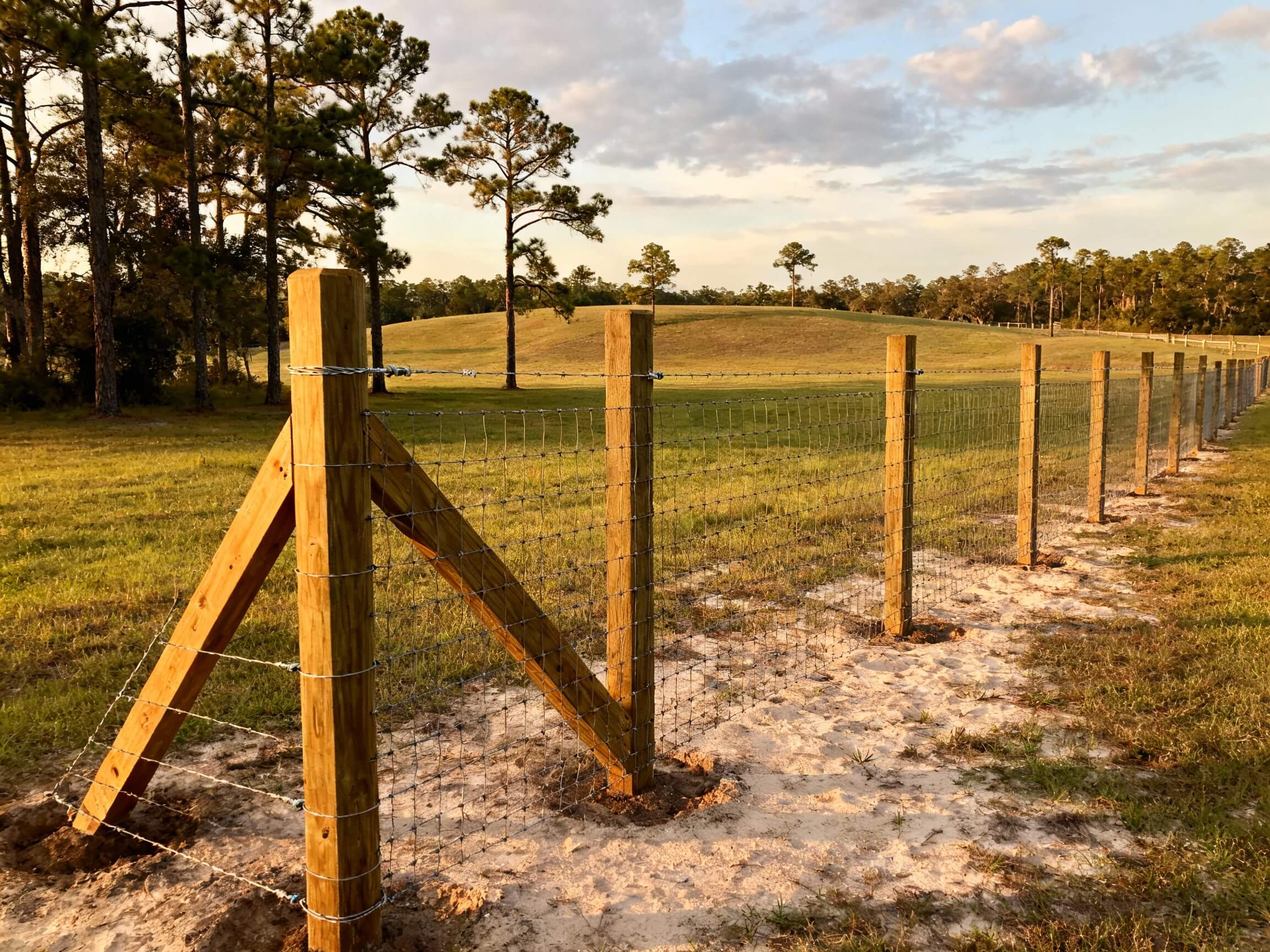
5 Goat Fence Ideas to Keep Your Herd Safe in the Southeast
Top Goat Fence Ideas for Southeastern Farms
Your goats are clever, curious, and natural escape artists (Escape Proof Goat Fencing). Here in the Southeast, you also have the constant threat of predators to worry about. A weak or poorly designed fence isn't just an inconvenience; it’s a risk to your animals, your property, and your peace of mind. The humid climate in the Florida Panhandle and surrounding areas quickly destroys inferior materials, turning a cheap fix into a costly, recurring problem.
By exploring proven goat fence ideas tailored for our unique environment, you can build a secure, long-lasting containment system. The right fence protects your investment and lets you focus on managing your herd, not chasing it. Let's look at the best options for farms in our region.
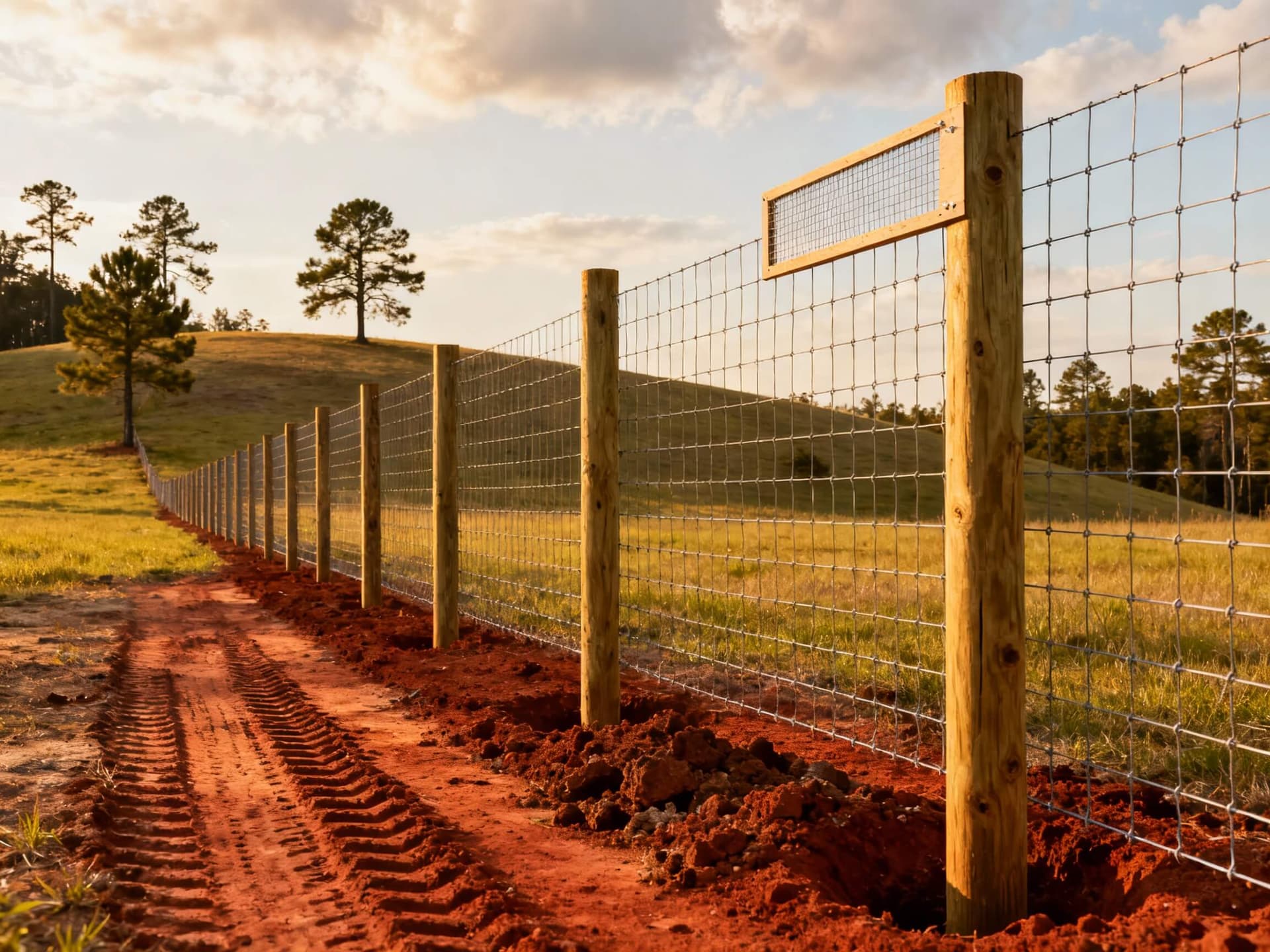
The Traditional Look: Wood Goat Fence Solutions
A classic wood goat fence offers a timeless, rustic aesthetic that many farm owners love. Board fences, like three- or four-rail designs, create a beautiful boundary. However, in our humid climate, wood requires careful selection and commitment to maintenance. Untreated wood or basic pressure-treated posts are highly susceptible to fungal rot and termite damage, often failing in just a few years.
To ensure longevity, it's crucial to use high-grade materials. We recommend posts treated to a .60 CCA rating for ground contact, as this offers superior protection against the moisture and pests prevalent in Florida, Alabama, and Georgia. A well-built wood fence must be paired with regular upkeep to maintain its strength and appearance.
The Security Standard: Woven & Welded Wire Ideas
For most goat owners, a woven wire fence is the gold standard for security and durability. Specifically, a 4x4 fixed-knot woven wire is one of the most effective goat wire fence ideas available GoatFarmers.com. The small 4"x4" openings prevent goats—even horned ones—from sticking their heads through and getting stuck. It also creates a formidable barrier against predators like coyotes and stray dogs.
When choosing wire, look for a Class 3 galvanization. This thicker coating provides excellent rust resistance, ensuring a lifespan of 20 years or more, even in our damp weather. While a welded wire goat fence can be an option, woven wire is more flexible and resilient, better absorbing impacts from animals without breaking. This type of fencing is a core part of our agricultural fencing services.
The Flexible Option: High-Tensile and Electric Systems
High-tensile wire fencing is a cost-effective solution for containing goats across large perimeters. Using multiple strands of highly tensioned wire, it creates a strong physical and psychological barrier. For rotational grazing, nothing beats the flexibility of electric netting. It's lightweight and easy to move, allowing you to manage pastures efficiently and improve herd health.
Most importantly, electric wire is a critical add-on for nearly any fence type. A "hot" wire placed near the top of your fence can deter climbing predators, while one near the bottom can stop them from digging. This combination of physical and psychological deterrents offers the highest level of security.
Key Design Factors for a Goat-Proof Fence
A successful goat fence is more than just good materials; it’s about smart design. Factoring in your animals' behavior and our local environmental challenges is key to building a truly effective containment system.
Choosing the Right Fence Height to Prevent Jumpers
Goats are incredible athletes, capable of jumping impressive heights. For most standard breeds, we recommend a minimum fence height of 48 inches (4 feet). For more agile breeds like Nigerian Dwarfs or particularly determined escape artists, a 5-foot fence provides extra security and peace of mind.
Predator-Proofing in the Florida Panhandle and South Georgia
Coyotes and neighborhood dogs are a major concern for livestock owners across the Florida Panhandle and into South Georgia. A tall fence isn't enough if a predator can dig underneath it. To create a predator-proof barrier, we recommend burying the bottom of your woven wire a few inches into the ground Pro Fence. Another highly effective method is to add a low-voltage electric "hot" wire about 6 inches off the ground along the exterior of your fence line.
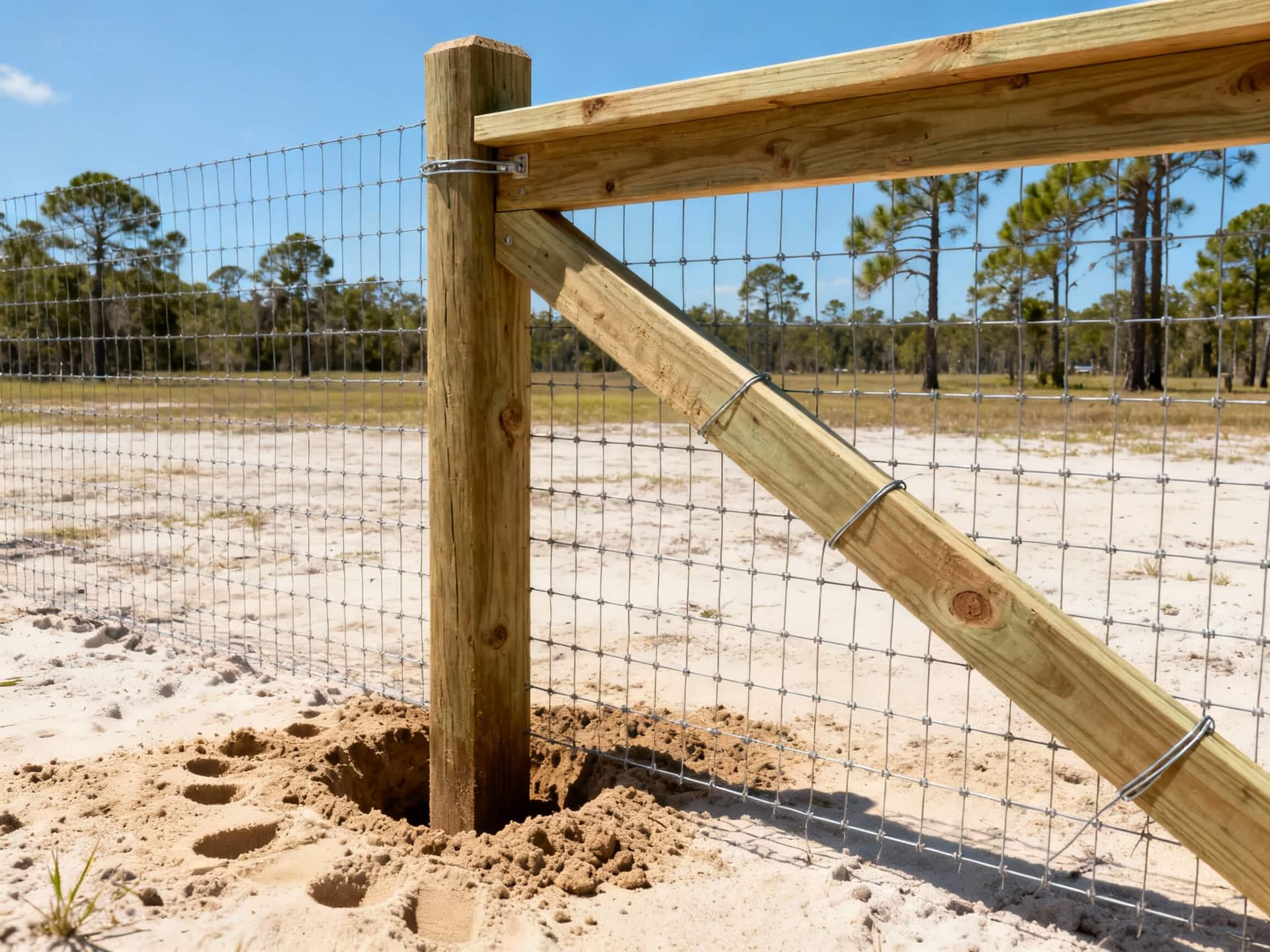
Securing Corners and Gates in Sandy Soil
The sandy soil common in our region poses a unique challenge for fence stability. Corner posts and gate posts bear the most tension and stress. Without proper support, they can lean or pull out of the ground, causing the entire fence line to sag. For landowners planning new entry points, our farm gate installation service shows how we build gates that stay level and secure even in loose, shifting soil.
The Real Cost of Goat Fencing in Our Region
Need Help?
Get expert fencing advice and free quotes. Our team is ready to help with your project.
Available Mon-Fri, 8am-6pm EST
When budgeting for a fence, it's easy to focus only on the upfront price tag. However, the true cost includes materials, installation, and long-term maintenance. A cheap fence that fails in five years is far more expensive than a quality fence that lasts for twenty.
Upfront Costs: Per-Foot Estimates for Materials & Labor
Material and installation costs vary based on terrain and specific choices. However, here are some general 2024-2025 estimates for our region to help you budget:
Note: These are estimates. Your final cost may vary based on site preparation, gate choices, and other factors.
Long-Term Value: Why Quality Installation Saves You Money
Focusing on the total cost of ownership is the smartest approach. A professionally installed fence using high-quality materials, like the fences we build in South Alabama, is an investment in your farm's infrastructure. By building it right the first time with deep-set posts and proper bracing, we help you avoid the costly repairs associated with premature post rot, termite damage, and fence failure. A Bomann fence is built to last, saving you money and stress for decades to come.
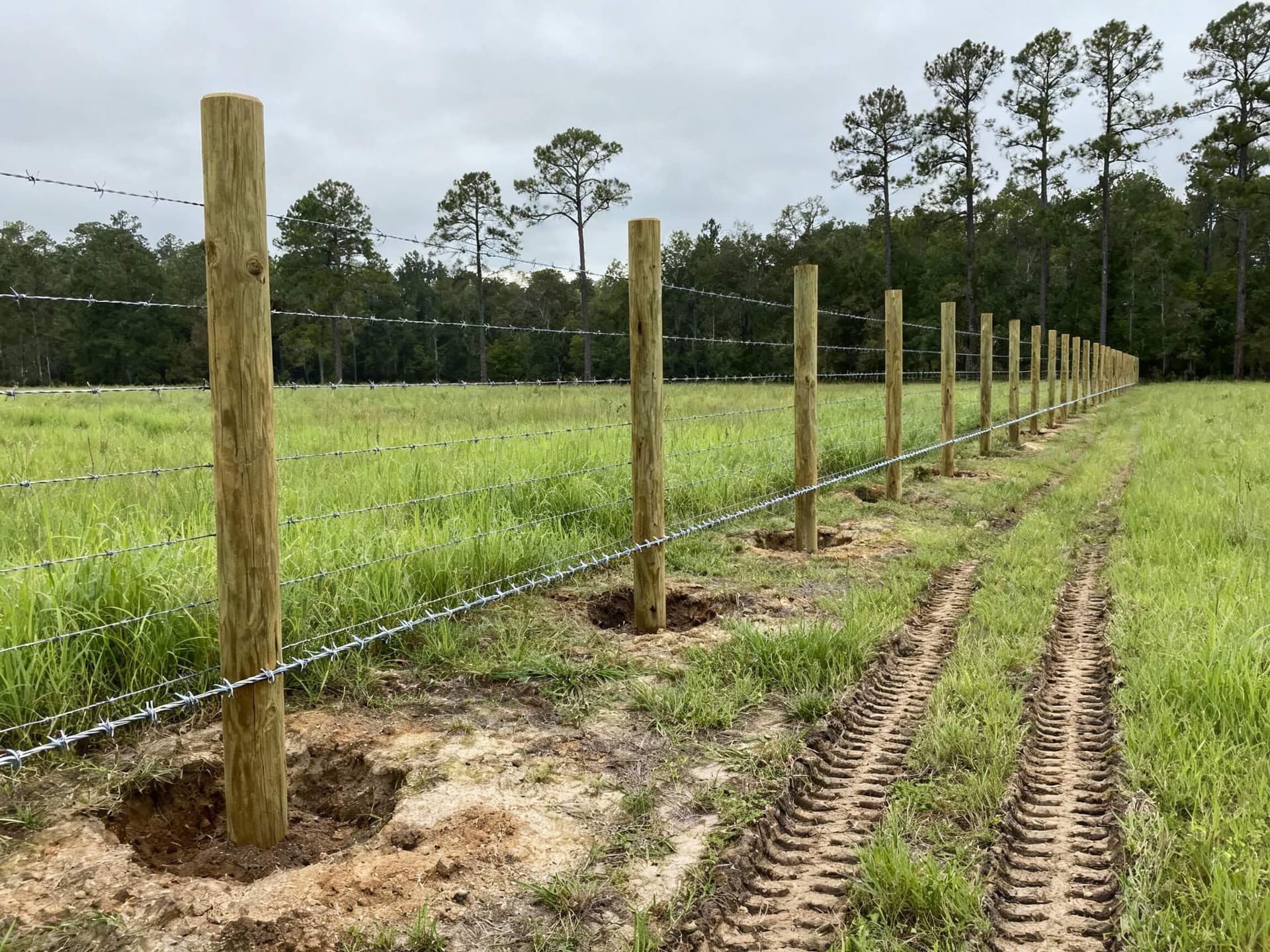
Frequently Asked Questions About Goat Fencing
What is the cheapest but most effective goat fence idea?
A high-tensile electric fence is often the most budget-friendly yet effective of the permanent goat fence ideas. It relies on a psychological barrier rather than a heavy physical one, reducing material costs. For temporary or rotational grazing, portable electric netting is an unbeatable, low-cost option.
How do you build a predator-proof goat fence in Florida?
The best method is a layered approach. Start with a 4-foot or taller woven wire fence with 4x4 inch squares. Then, either bury the bottom of the wire 6-12 inches deep or add an electrified strand along the outside of the fence about 6 inches from the ground. This combination deters both climbing and digging predators.
Is using a barbed wire fence for goats a safe idea?
No, we strongly advise against using a barbed wire fence for goats. Goats have thin skin and thick coats, and they tend to push and rub against fences. Barbs can easily cause deep cuts and serious injuries that can lead to infection. Woven wire or smooth high-tensile wire are much safer alternatives.
What is the best type of fence for goats that keep escaping?
For chronic escape artists, the most secure solution is a 4x4 fixed-knot woven wire fence that is at least 4-5 feet tall. The small openings prevent them from squeezing through, and the height stops most jumpers. Adding an offset electric wire on the inside can provide extra discouragement.
How high does a fence need to be for Nigerian Dwarf goats?
While Nigerian Dwarf goats are small, they are excellent jumpers. A 4-foot (48-inch) high fence is the recommended minimum. The most critical factor for these smaller goats is the mesh size; 4x4 inch or smaller openings are essential to prevent them from slipping through.
Protect Your Herd With a Professionally Built Goat Fence
The best goat fence for your farm is one that's built to withstand our region's humidity, pests, and predators. A durable system like woven wire, professionally installed with deep-set posts and sturdy bracing, provides unmatched security and long-term value.
Protect your herd with a fence built to last. For a free, no-obligation estimate on your goat fencing project in the Florida Panhandle, South Alabama, or South Georgia, contact the agricultural fencing experts at Bomann Fencing today, and check out our comprehensive goat-proofing guide.
Share this article
Related Posts
Need Help?
Get expert fencing advice and free quotes. Our team is ready to help with your project.
Available Mon-Fri, 8am-6pm EST
Related Posts
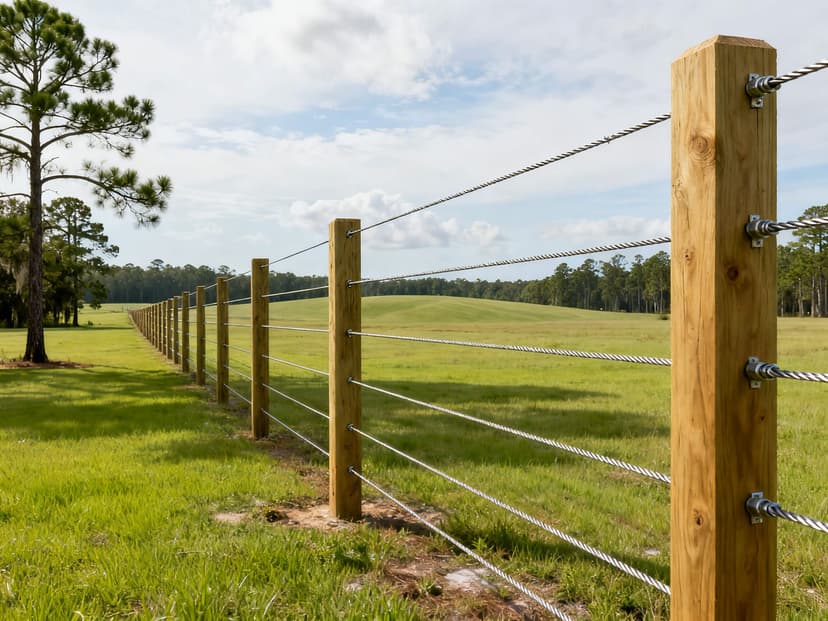
Cable Fence for Cattle: The SE Rancher's Durable Choice
Why Choose a Cable Fence System for Your SE Ranch? You need a strong, reliable fence to contain your cattle across large...
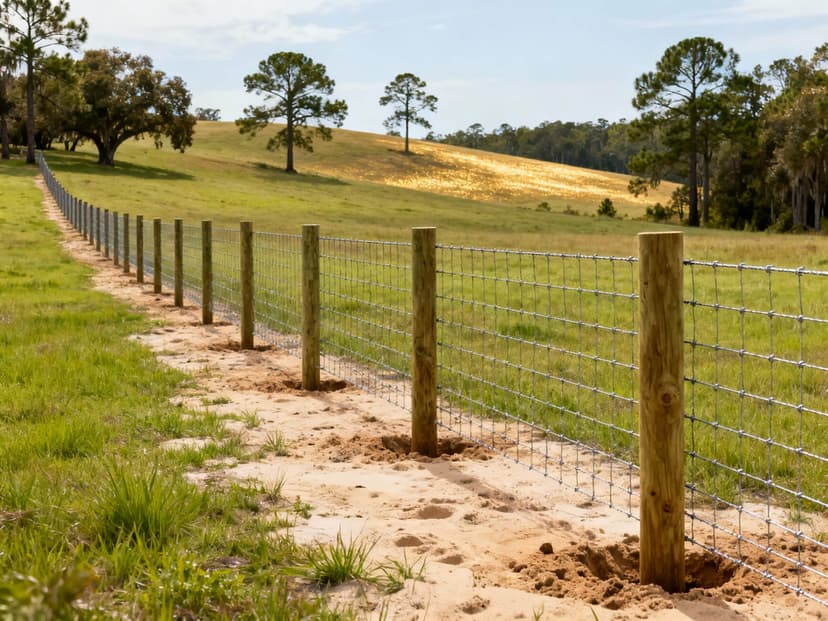
Cattle Fence Roll: The Complete Guide for Southeast Farms
Understanding Your Cattle Fence Roll Options When fencing a large operation, the type of wire you choose is a decision t...
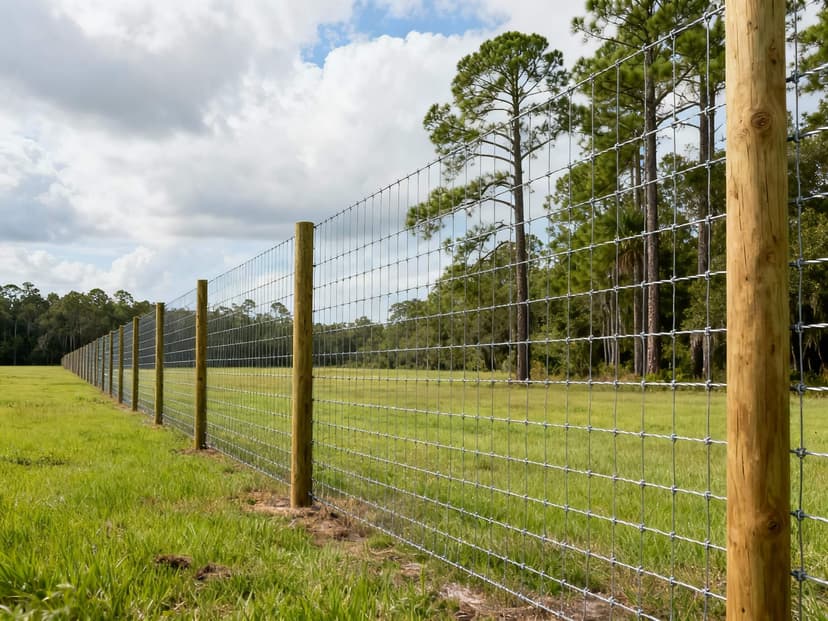
6 Proven Applications for a 6 Foot Field Fence
6 Proven Applications for a 6 Foot Field Fence As a farmer or rancher in the Southeast, you need a fencing solution that...
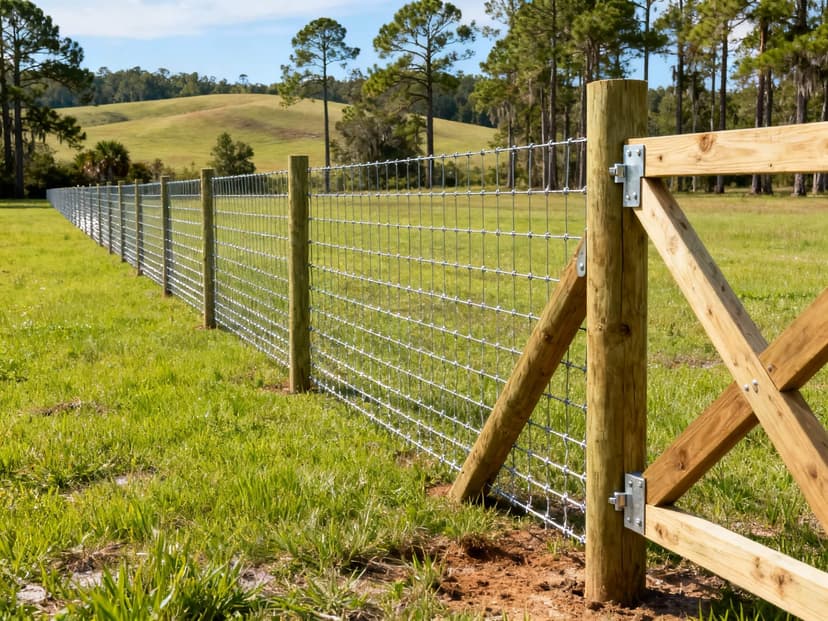
4 ft Field Fence: A Farmer's Guide to Cost & Setup
A Complete Guide to 4 ft Field Fence for Your Modern Farm For farmers and ranchers across the Florida Panhandle, South A...
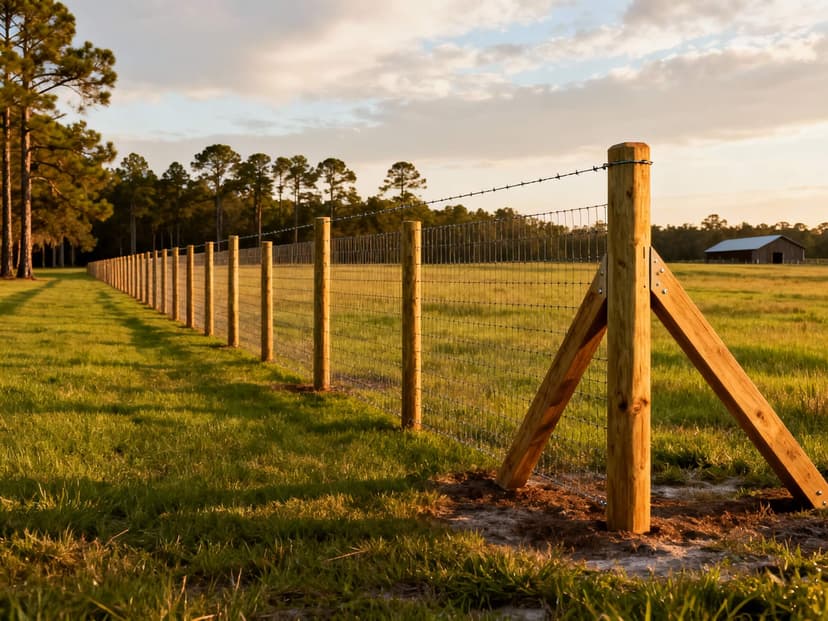
Livestock Wire Fence: A Pro's Guide for the Southeast
Planning and Material Selection for the Southeast A durable livestock wire fence starts long before the first post is dr...






